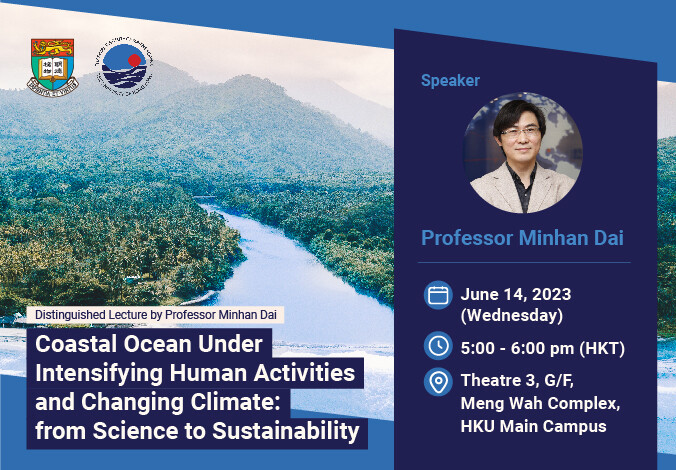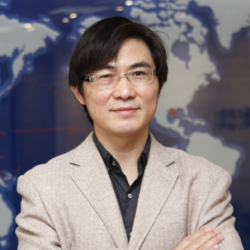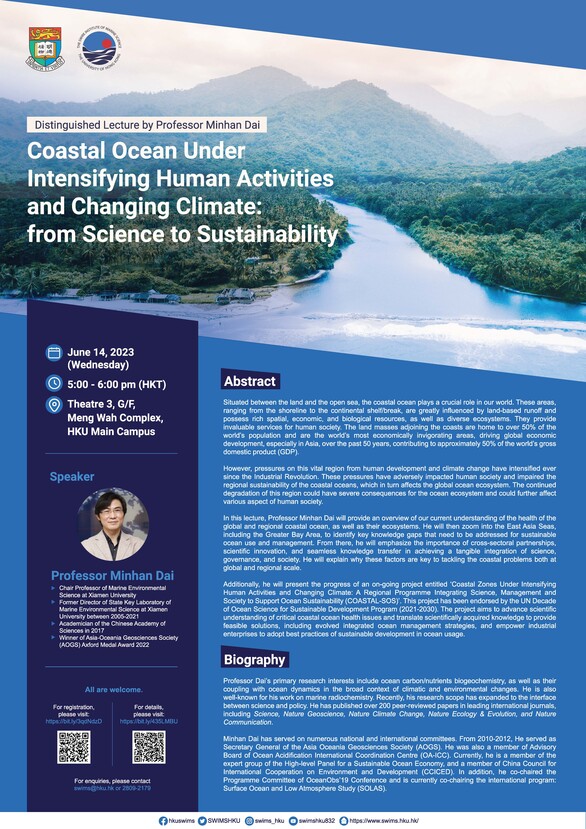SWIMS Distinguished Lecture - Coastal Ocean Under Intensifying Human Activities and Changing Climate: from Science to Sustainability

- Date & Time
- June 14, 2023 (Wednesday) | 5:00 - 6:00pm (HKT)
- Venue
- Theatre 3, G/F, Meng Wah Complex, HKU Main Campus ( Map )
- Language
- English
- Speaker
- Professor Minhan Dai
Chair Professor of Marine Environmental Science at Xiamen University; Former Director of State Key Laboratory of Marine Environmental Science at Xiamen University; Academician of the Chinese Academy of Sciences in 2017; Winner of Asia-Oceania Geosciences Society (AOGS) Axford Medal Award 2022
Situated between the land and the open sea, the coastal ocean plays a crucial role in our world. These areas, ranging from the shoreline to the continental shelf/break, are greatly influenced by land-based runoff and possess rich spatial, economic, and biological resources, as well as diverse ecosystems. They provide invaluable services for human society. The land masses adjoining the coasts are home to over 50% of the world’s population and are the world’s most economically invigorating areas, driving global economic development, especially in Asia, over the past 50 years, contributing to approximately 50% of the world’s gross domestic product (GDP).
However, pressures on this vital region from human development and climate change have intensified ever since the Industrial Revolution. These pressures have adversely impacted human society and impaired the regional sustainability of the coastal oceans, which in turn affects the global ocean ecosystem. The continued degradation of this region could have severe consequences for the ocean ecosystem and could further affect various aspects of human society.
In this lecture, Professor Minhan Dai will provide an overview of our current understanding of the health of the global and regional coastal oceans, as well as their ecosystems. He will then zoom into the East Asia Seas, including the Greater Bay Area, to identify key knowledge gaps that need to be addressed for sustainable ocean use and management. From there, he will emphasize the importance of cross-sectoral partnerships, scientific innovation, and seamless knowledge transfer in achieving a tangible integration of science, governance, and society. He will explain why these factors are key to tackling the coastal problems both at global and regional scale.
Additionally, he will present the progress of an on-going project entitled ‘Coastal Zones Under Intensifying Human Activities and Changing Climate: A Regional Programme Integrating Science, Management and Society to Support Ocean Sustainability (COASTAL-SOS)’. This project has been endorsed by the UN Decade of Ocean Science for Sustainable Development Program (2021-2030). The project aims to advance scientific understanding of critical coastal ocean health issues and translate scientifically acquired knowledge to provide feasible solutions, including evolved integrated ocean management strategies, and empower industrial enterprises to adopt best practices of sustainable development in ocean usage.

Speaker Professor Minhan Dai
Chair Professor of Marine Environmental Science at Xiamen University; Former Director of State Key Laboratory of Marine Environmental Science at Xiamen University; Academician of the Chinese Academy of Sciences in 2017; Winner of Asia-Oceania Geosciences Society (AOGS) Axford Medal Award 2022
Professor Dai’s primary research interests include ocean carbon/nutrients biogeochemistry, as well as their coupling with ocean dynamics in the broad context of climatic and environmental changes. He is also well-known for his work on marine radiochemistry. Recently, his research scope has expanded to the interface between science and policy. He has published over 200 peer-reviewed papers in leading international journals, including Science, Nature Geoscience, Nature Climate Change, Nature Ecology & Evolution, and Nature Communication. Minhan Dai has served on numerous national and international committees. From 2010-2012, He served as Secretary General of the Asia Oceania Geosciences Society (AOGS). He was also a member of Advisory Board of Ocean Acidification International Coordination Centre (OA-ICC). Currently, he is a member of the expert group of the High-level Panel for a Sustainable Ocean Economy, and a member of China Council for International Cooperation on Environment and Development (CCICED). In addition, he co-chaired the Programme Committee of OceanObs’19 Conference and is currently co-chairing the international program: Surface Ocean and Low Atmosphere Study (SOLAS). Since 2009, Professor Dai has led two China Coastal Carbon programs in the framework of ‘973’ programs sponsored by the Ministry of Science and Technology. He is also a leading Principal Investigator of a major project called ‘CARBON Fixation and Export in the oligotrophic ocean’ (Carbon-FE) (2019-2023) funded by National Natural Science Foundation of China (NSFC). He recently brought together a strong international team of cross-sectoral stakeholders, including leading academic institutions, industrial enterprises, non-profit foundations, and non-governmental/intergovernmental organizations (NGO/IGOs) from East Asian countries, to formulate a proposal entitled ‘Coastal Zones Under Intensifying Human Activities and Changing Climate: A Regional Programme Integrating Science, Management and Society to Support Ocean Sustainability (COASTAL-SOS)’. This proposal was endorsed by the UN Decade of Ocean Science for Sustainable Development Program (2021-2030) as a project. The project aims to advance scientific understanding of critical coastal ocean health issues and to translate this scientifically acquired knowledge to provide feasible solutions, including evolved integrated ocean management strategies, and to empower industrial enterprises towards adopting best practices of sustainable development in ocean usage.


